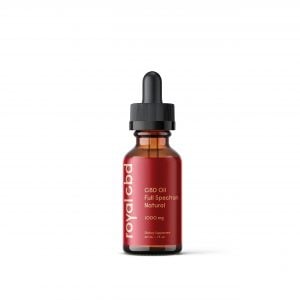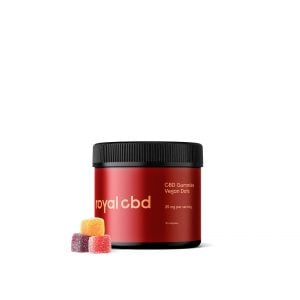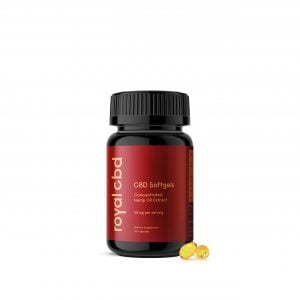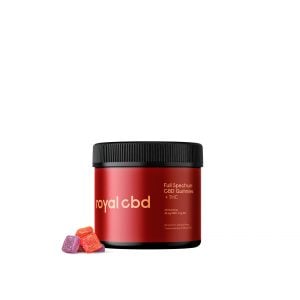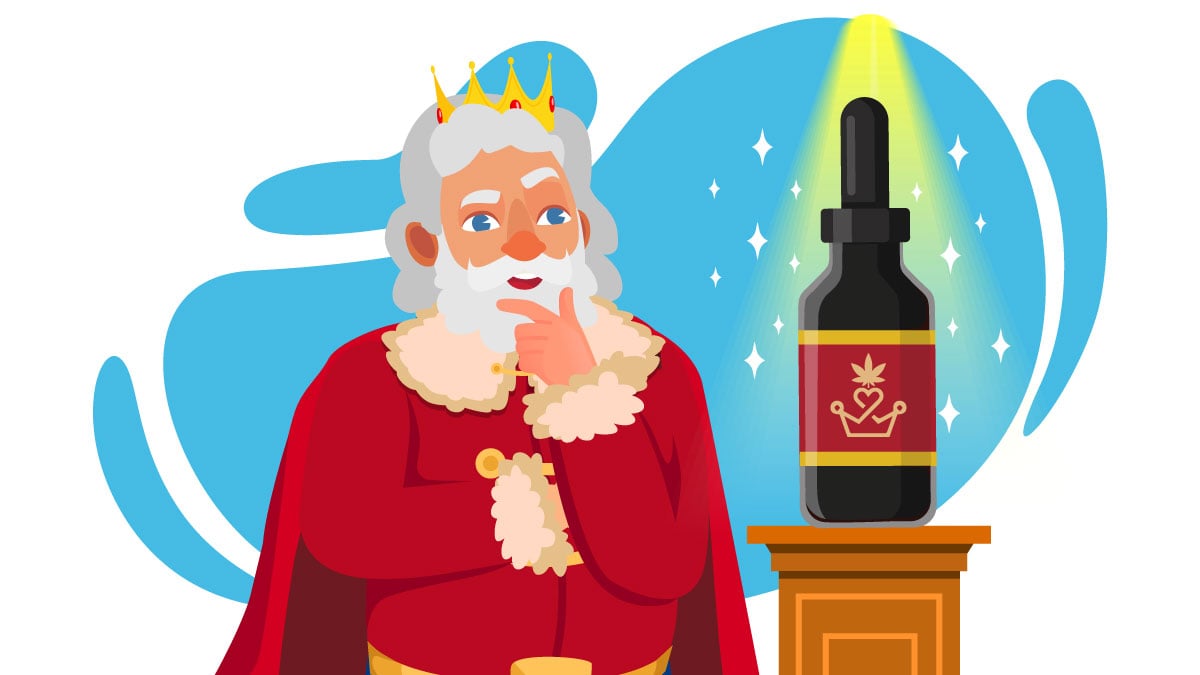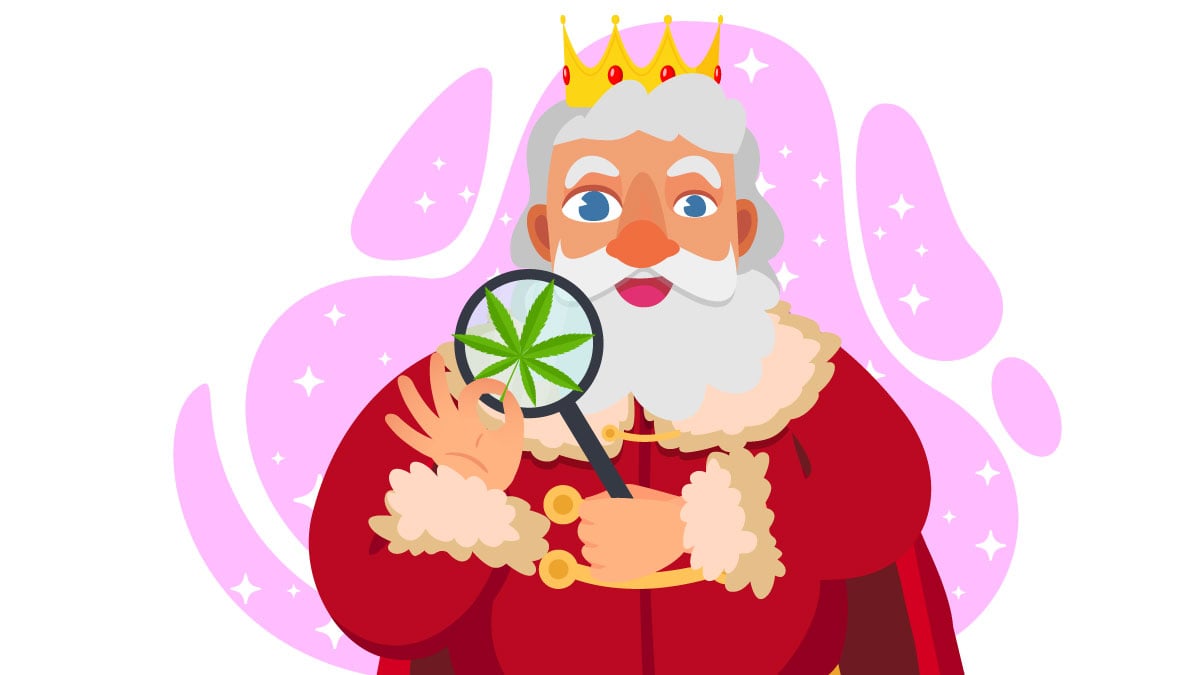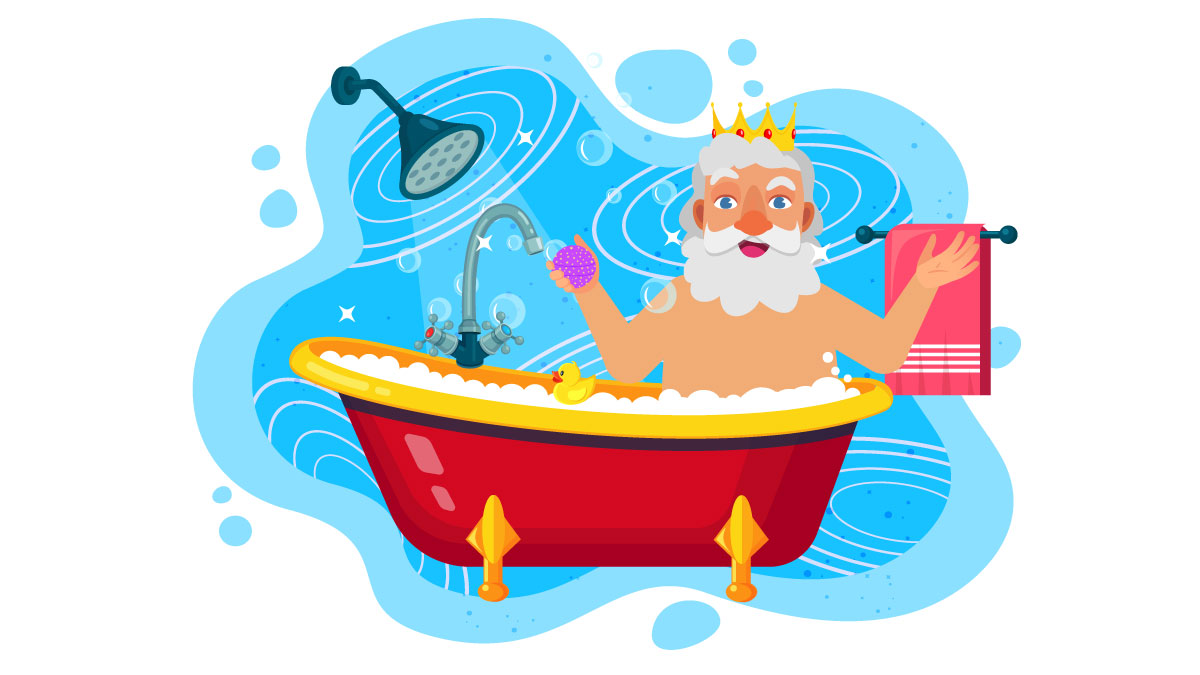A growing body of research highlights the health benefits of CBD. Studies have shown that CBD has anti-inflammatory and seizure-suppressant properties, as well as the ability to reduce anxiety and help people manage their daily stresses.
The popularity of CBD has recently exploded, reaching every corner of the world and starting a global cannabis revolution. Hemp-derived CBD oil is legal in all 50 states as long as the THC content doesn’t exceed 0.3%.
According to WHO, CBD is a safe and well-tolerated compound, even in doses as high as 1,500 mg daily.
But is CBD addictive?
Can you get hooked on CBD oil despite the plethora of benefits it comes with?
This article will give you a complete answer to these questions. We’ll cover the mechanism of addiction, summarize how CBD affects the brain, and point out CBD’s potential to ease withdrawal symptoms in addicted individuals.
How Addiction Works
Addiction is defined as a complex physiological and psychological response to external stimuli. Scientists link addiction to changes in brain function and structure. Psychologists and addiction experts agree that three states can start addictive processes.
We discuss them briefly below:
Pleasure Triggers
When the brain gets in contact with substances like nicotine, caffeine, or a drug like cocaine, it gets flooded with neurotransmitters such as dopamine that can lead to a surge of pleasurable sensations. The sudden influx of dopamine causes it to build up in the nucleus accumbens, a region within the hypothalamus that plays an important role in addiction. Researchers suggest that the likelihood of addiction depends on several variables: the speed, reliability, and intensity of dopamine buildup. How a substance is administered — whether through smoking, in pills, or intravenously — can influence dopamine response.
Learned Behaviors
Scientists studying addiction state that pleasure-seeking isn’t the only factor that contributes to addiction. According to many experts, the picture is much bigger, and in fact, it may come from a set of learned behaviors that make users continually seek out addictive substances. Dopamine may form and strengthen feelings of pleasure, but the very activity that led up to its release is even more important. Most theories around addiction point to a reward-related learning process as the main mechanism behind addiction. In this process, dopamine works together with glutamate, another major neurotransmitter — causing the brain to connect pleasurable feelings with the activity that leads to them.
Prolonged Exposure to Certain Substances
If you continuously use certain substances, it can cause nerve cells located in the prefrontal cortex and nucleus accumbens to become gradually dependent on activation from these active compounds. The users then seek out the addictive substance more often, which results in a less impactful psychoactive experience. In other words, certain substances cause you to build tolerance. Drug tolerance is very dangerous, especially when it comes to drugs such as opioids, where there’s a high risk of lethal overdose.
Users who try to go cold turkey can experience severe withdrawal symptoms. Depending on the substance, withdrawals can include headaches, tremors, pain in the bones and muscles, nausea, vomiting, and irritability.
What is CBD and How Does It Work?
CBD (or cannabidiol) is one of the two major components of cannabis. Unlike the other compound, THC, CBD lacks psychoactive properties, meaning it won’t make you feel high in a way THC does. CBD may balance out THC by modulating its psychoactivity in the brain.
CBD interacts with major receptors in the endocannabinoid system; the prime regulatory network in all animals. These receptors send messages throughout the body, delivering signals for the brain to interpret. The functioning of your brain is largely dependent on these signals; this way, it can regulate important processes throughout the body, allowing it to maintain homeostasis — a fancy term for biochemical balance.
CBD may support homeostasis through several different routes. Scientists believe that CBD has more than 65 molecular targets, which would explain its wide range of benefits and applications. CBD’s interaction with the endocannabinoid system can influence 5-HT1A receptors that are sensitive to a neurotransmitter called serotonin.
Serotonin is a major player in mood regulation; it can also intensify feelings of happiness and relaxation. CBD acts as a natural inhibitor of the 5-HT1A receptors. It blocks its reuptake in the brain, allowing higher concentrations of the neurotransmitter to circulate in the body.
Using a similar mechanism, CBD interacts with the TRPV1 receptors by tapping into their sites and blocking signals responsible for pain perception. CBD may also affect the nuclear receptor PPAR-gamma, which regulates glucose metabolism and the storage of fatty acids.
The above interactions seem promising in terms of managing addiction and withdrawal symptoms, but before we elaborate on that, let’s answer the title question.
CBD and Addiction: Is CBD Oil Addictive?
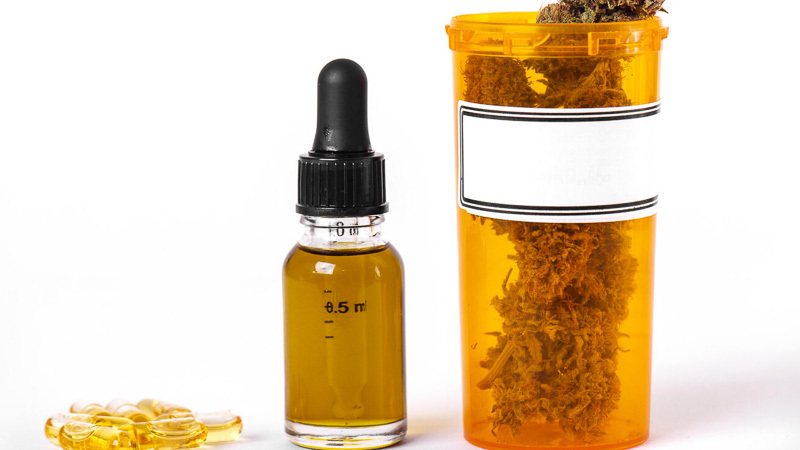
Since CBD doesn’t produce the psychoactive buzz associated with THC, it has a very limited potential for abuse according to scientists. A 2017 study from the Journal of Drug and Alcohol Dependence reviewed the results of a previous study, in which researchers administered different doses of oral CBD to frequent marijuana users. The subjects took CBD alone and in combination with smoked marijuana. The researchers concluded that CBD is as likely to be abused as the placebo.
A few years earlier, a 2011 study concluded that CBD is safer than THC and other cannabinoids. Researchers found that CBD is well-tolerated in humans, even in high doses up to 1,500 milligrams daily. Unlike THC, CBD didn’t impair psychological functions or motor skills, nor did it change the blood pressure, body temperature, or heart rate.
Interestingly, even THC cannot lead to physical addiction. According to addiction experts, 91% of marijuana users will never get addicted to THC. The remaining 9% percent will just form negative habits around the substance, which may lead to some form of abuse.
Since THC can be habit-forming, it’s important to know the difference between the two sources of CBD extracts: hemp and marijuana.
Hemp-Derived CBD vs Marijuana-Derived CBD
CBD can be extracted from hemp and marijuana. Although these plants share the same parent — Cannabis sativa L. — they have different chemical profiles and THC/CBD ratios.
Marijuana is naturally THC rich, so CBD oils produced from marijuana strains — even those high in CBD — will contain a significant amount of THC. These products can get the user high.
However, when CBD oil is made from hemp plants, it won’t produce any intoxicating effects due to its almost non-existent THC content. Hemp plants usually contain 0.3% THC or less, boasting higher levels of CBD.
CBD derived from hemp plants is not addictive. It’s also federally legal; you can easily find it online and over-the-counter in major pharmacies, dispensaries, vape stores, and smoke shops.
At Royal CBD, we only make hemp-based extracts that are tested and certified by an independent laboratory to ensure they contain less than 0.3% THC and are compliant with federal law.
CBD Could Help Fight Addiction, Studies Say
The World Health Organization issued a comprehensive report on CBD in 2017, where they acknowledged it as a safe substance with no potential for abuse.
Earlier in the article, we mentioned that CBD could also be used to help combat addiction and withdrawal symptoms.
In a 2013 report, researchers treated a 19-year-old woman with cannabis withdrawal symptoms using CBD for 10 days. After that time, they noted an effective decrease in the severity of her symptoms. Earlier in 2010, another study published in Neuropsychopharmacology tested a total of 94 cannabis users to examine the role of CBD-to-THC ratios in amplifying the effects of psychoactive compounds and attentional bias to drug stimuli. Compared with smokers of high-THC strains, the study found that subjects who took high-CBD strains showed a lower attentional bias to food and drug stimuli, as well as lower self-rated dependence on cannabis. The scientists concluded that CBD could be used in the treatment of cannabis dependence and other addictive disorders.
CBD could also help curb addiction to other substances, such as nicotine or opioids. According to a 2013 study published in Addictive Behaviors, a treatment of CBD over a week-long period reduced the number of cigarettes smoked by 40% in addicted subjects, while the placebo group didn’t show any significant difference.
There are also studies coming from animal models that prove CBD’s potential to cut down on the use of other addictive substances. In a 2018 preclinical animal study published in Neuropsychopharmacology, researchers administered CBD gel to lab rats that showcased addiction-like behavior towards alcohol or cocaine after voluntary use. The research team found out that CBD was effective in reducing drug use in rodents, and also curbed the side effects of addiction, such as anxiety and impulsivity.
Coming back to human models, a 2019 study published in the American Journal of Psychiatry found that CBD could benefit people with cravings associated with heroin addiction. The study examined 42 adults who had been using heroin for an average of 13 years. Researchers divided the participants into three groups.
Two groups were administered different doses of CBD. The third group received a placebo:
- 800 mg CBD
- 400 mg CBD
- Placebo
Compared with the placebo, those who took CBD significantly reduced the anxiety and craving from heroin addiction withdrawals.
What Are the Side Effects of CBD Oil? Can You Overdose on CBD?
CBD has a well-established safety profile. There are a few mild side effects that might occur when you take too much CBD oil at a time.
Potential adverse reactions to CBD include:
- Dry mouth
- Lower blood pressure
- Changes in appetite
- Dizziness
- Sedation
- Diarrhea
That being said, you can’t overdose on CBD because it doesn’t affect the brain stem area that controls breathing.
There’s also one important subject we feel obliged to cover.
CBD & Drug Interactions: Talk to Your Doctor
When you take CBD, it can interact with a system called Cytochrome p450. This system is responsible for metabolizing the majority of active compounds from pharmaceutical medications. CBD inhibits Cytochrome p450, preventing it from processing these compounds in the liver.
This mechanism is similar to how eating grapefruit along with your medication can affect your metabolism.
The CBD-drug interactions may lead to a variety of second-hand side effects that aren’t caused by CBD per se. They may also negatively impact the efficacy of your treatment. We recommend that you talk to your doctor if you take any pharmaceutical drugs and are afraid they may interact with CBD.
Read our guide on CBD-drug interactions for a full list of substances that are metabolized by Cytochrome 450.
CBD and Addiction: Bottom Line
Addiction is a brain disease. It manifests itself by intense cravings towards a particular substance despite harmful and detrimental consequences. Those who have addiction problems show several symptoms, from poor cognition to disturbed body functions, along with behaviors that may compromise their daily lives.
Initial studies haven’t found a link between CBD and alterations in perception, judgment, or cognition. Without the feelings of “high”, the brain may not associate the substance with the reward centers. CBD also doesn’t cause withdrawal symptoms and can’t be lethally overdosed.
Interestingly, recent studies have concluded that CBD may be useful in curbing addiction to many substances, including alcohol, nicotine, opioids, and heroin. Not only could CBD help with physiological addiction, but it could also aid people in fighting the bad habits they’ve created around different substances and activities.
All in all, it looks like CBD can be a useful tool against addiction in more than one area.
